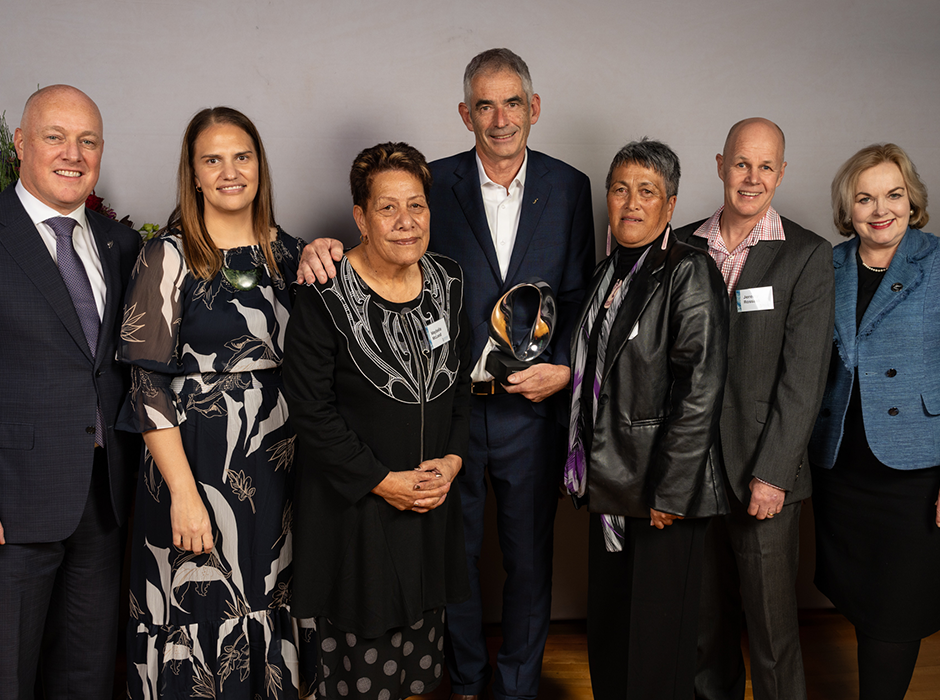
The Otago-led Hereditary Diffuse Gastric Cancer Group received the Prime Minister’s Te Puiaki Pūtaiao Matua a Te Pirimia Science Prize 2023 at an award ceremony at Parliament last night. Pictured (from left) are Prime Minister Rt Hon Christopher Luxon, Associate Professor Karyn Paringatai, Maybelle McLeod, Professor Parry Guilford, Erin Gardiner, Dr Jeremy Rossaak, and Minister of Science, Innovation and Technology and Minister for Space, Hon Judith Collins. Photo: Rebecca McMillan Photography
The University of Otago’s HDGC Research Group has received the Te Pūiaki Putaiao Matua a Te Pirimia Prime Minister’s Science Prize for 2023.
The group, known for discovering the gene which causes inherited stomach cancer, was recognised for the significant impact it has had on the treatment and management of the disease, both in Aotearoa New Zealand and internationally.
In 1995, a partnership was established between Otago researchers and Kimihauora Health and Research Clinic, on behalf of the McLeod whānau (Ngāi Te Rangi, Ngāti Ranginui) who had a strong history of stomach cancer and wanted to find the gene responsible.
In the 28 years that followed, through a unique whānau-centred collaborative approach, the CDH1 gene was identified, a new inherited cancer syndrome named – Hereditary Diffuse Gastric Cancer (HDGC) – and characterised, a genetic test developed, and effective and equitable management techniques established for the disease.
Principal investigator Professor Parry Guilford describes the collaboration as “ordinary people doing extraordinary things”.
“Our conservative estimate of 400-450 lives saved in Aotearoa alone demonstrates the profound impact of this research on our society – we’ve restored hope to those families carrying the gene,” he says.
The group’s impact can be felt overseas, too, as HDGC families have been identified in most developed countries, with an estimated 75,000 CDH1 carriers in the US and Europe.
Professor Parry is proud of the work which has been achieved, how it has happened, and the impact it has had on real people.
“We are all emotionally invested in this work, and it has been so empowering for it to be whānau-led.”
One particularly pleasing aspect has been producing international clinical management guidelines for HDGC. The group led the publication of these in 2020 and is currently involved in updating them.
“It was a huge amount of work for us, but it has been fantastic to implement our research findings. It is one thing to find the gene, but now we can actually test for it and manage treatment and recovery for patients.”
In awarding the prize, the selection committee said the enduring partnerships between the research team, hospital clinicians, whānau members, and their community serves as an exemplar of how to meet a community’s needs and how to uphold cultural values and data sovereignty within healthcare research.
The award comes with a $500,000 prize, which Professor Guilford says will enable the team to extend its work.
The plan is to build an online information hub about the CDH1 gene in Aotearoa. It will build a detailed map of the affected whānau, provide information about treatment and management, and help identify new families affected by the gene.
The money will also be used to research better ways to care for affected families.
Professor Guilford says a full gastrectomy is currently the safest treatment option, but it is a difficult operation with long-term physical and mental impacts.
Improvements in surveillance methods, and drugs that prevent cancers from developing in the first place, would allow gene carriers to delay, or even avoid, having their stomach removed, without increasing the risk of cancer.
“Impactful, significant research requires the collision of many factors: a problem of societal, human importance, technological advance, coordinated multidisciplinary effort, cultural change, and above all, a shared vision.
“Our research on inherited stomach cancer has combined those factors to bring about a better, more hopeful world for thousands of people,” Professor Guilford says.